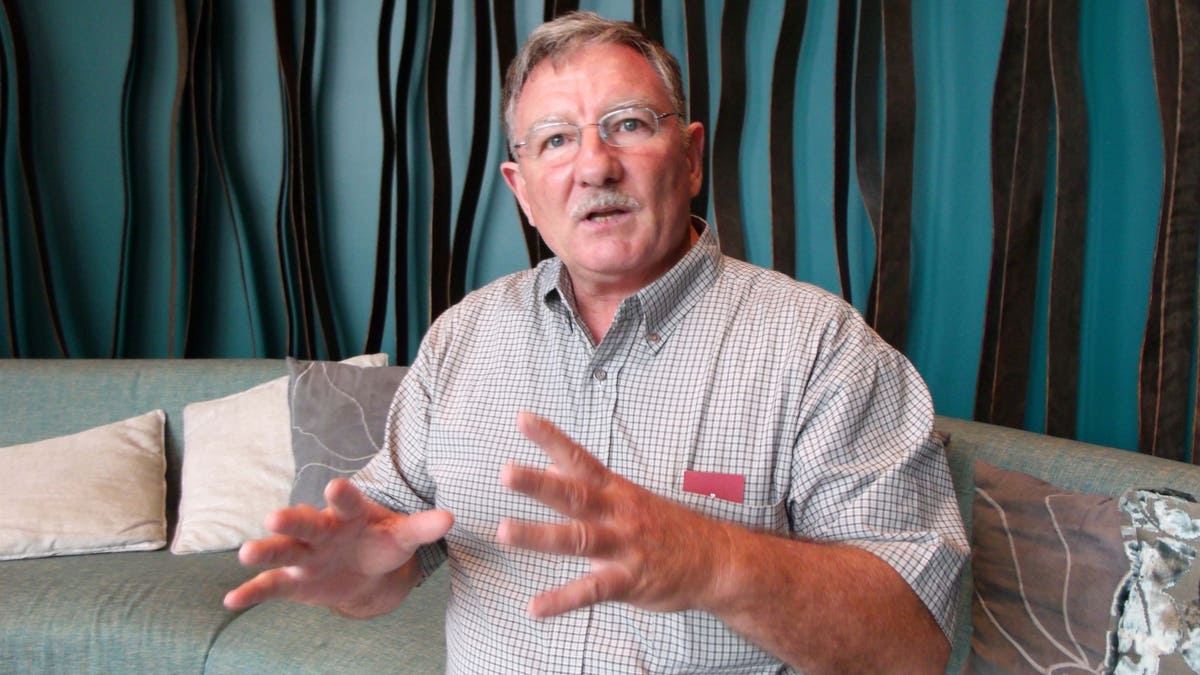
Paul Bridges, Mayor of the town of Uvalda, Georgia. (Llorente/Fox News Latino)
Atlanta, Ga. – He’s a 60-year-old self-styled conservative Republican who long has lived in a farming area in south Georgia.
Life for Paul Bridges was about work, his family and his three goats – Susan, Clarissa and Bridget – who he milks at least twice a day.
When Bridges heard snippets about a plan that fellow Republican lawmakers in his state were working on to crack down on illegal immigration, he was firmly in favor of the idea.
“I was all for it,” Bridges says about Georgia’s law, known as HB 87. “We have to know who’s coming across our borders. I thought it would make us safer. I swallowed it, what they said about the law, until I actually read it. This law makes our communities more unsafe by making people afraid [of police].”
“This law makes criminals of ordinary people, people who are very productive in our communities, who participate, parents who have U.S. citizen children.”
And so Bridges, in his third year now as mayor of Uvalda, a 1.9-square-mile town of just 600 people – many tied in one way or another to farming – found himself on the front lines of the fight against his state’s immigration law.
When you peel everything away – it’s not because of money, it’s not because of love – it’s because they are brown.
The diehard Republican became the accidental immigration activist – joining forces with groups he opposed on so many levels, disagreed with on so many issues, to fight HB 87. He joined the American Civil Liberties Union and the Southern Poverty Law Center in a lawsuit challenging the Georgia measure.
He testified before a U.S. Senate subcommittee last year about the need for comprehensive immigration reform which would tighten immigration laws, border security, but also provide a pathway to legalization. Bridges, a diminutive, plain-spoken man with a down-to-earth mien, also sent a statement to the U.S. Supreme Court, which is expected to rule later this month on Arizona’s controversial immigration law.
He wrote in a recent blog: “I found Georgia’s harsh law so un-American that I joined with unlikely bedfellows to sue the state. Did I ever dream that I would be joining a class action suit with the American Civil Liberties Union and the Southern Poverty Law Center? No, but I also didn’t dream my state would go down the awful path of creating felons out of grandparents who have an undocumented in-law or step-grand in their home or automobile."
Georgia’s law, parts of which were put on hold by the courts, seeks to crack down on undocumented immigrants by empowering police to investigate the immigration status of people they encounter who they suspect could be in the country unlawfully.
The law also calls for, among other things, Georgia businesses to ensure that new hires were eligible to work in this country, and made it a crime to harbor or transport undocumented immigrants.
“I have friends who are undocumented, who have U.S. citizen children,” Bridges says in an interview at a hotel in downtown Atlanta, where he will deliver opening remarks at a summit Monday that will look at immigration issues in the Southeast. “So this law would require me to not let the parents into my house, but let their children in because they’re U.S. citizens.”
People ask Bridges if he is really a Republican, because, they say, he sounds awfully liberal when he talks these days.
Bridges says his talk about how important immigrants – yes, including undocumented ones – are to Georgia’s economy and about how immigration policy isn’t taking into account the nation’s need for their labor is very Republican.
“We Republicans are business supporters, small businesses, especially, are the engine of the economy,” he says. “These state laws try to duplicate federal laws, the Republican idea is not to expand government, not to duplicate laws. Republicans are strong supporters of family values, these laws that deport people who have U.S. citizen children separate families.”
And he notes that presidents who pushed the hardest for immigration reform policies that would allow some undocumented immigrants to legalize their status were Republicans – Ronald Reagan and George W. Bush.
Bridges says he hopes that the one-day summit on Monday will push forward a regional discussion in the Southeast on the need for comprehensive immigration reform that will not be totally about enforcement.
“I hope it gets legislators in other Southern states who might be considering passing a law like Georgia’s to see that there are other, better ways to deal with immigration,” he said.
Bridges says that migrant workers have rapidly disappeared in the state. When the state laws are coupled with federal immigration programs such as Secure Communities that have increased the number of deportations, legal and illegal immigrants are reluctant to work, he says.
“Some of the workers don’t have legal documents and some of them do. But the enforcement-only laws scare all of them,” Bridges said. “Someone here legally doesn’t want to work in a field or ride in a van with somebody illegal, because it could force them to defend themselves in court” if they’re lumped in with the undocumented workers.
The impact of new laws has been immediately evident in Georgia, where the agricultural industry estimates it has lost at least $300 million and as much as $1 billion since laws targeting undocumented immigrants were passed.
“Immigrant workers made our Vidalia onions popular in the country,” says Bridges, who has learned Spanish. “In the 1970’s, we had the mechanism and the way for distribution for our onions, but we didn’t have the skilled labor force, until the migrants came from Mexico.”
“Workers have left,” Bridges says. “I see them packing up. I even know U.S. citizens who have spouses who are undocumented immigrants who are leaving because they’re afraid they’ll get in trouble.”
He’s been told by migrant women in his community that they are afraid to call the police about domestic violence.
Andrea Hinojosa, executive director of the Southeast Georgia Communities Project, a Lyons-based group that assists migrant workers, nods knowingly as Bridges describes the fear that Georgia’s law is generating in immigrant communities.
“Women tell me they’re afraid to report domestic violence,” she says. “Police often say to them that they’ll take both them and the man in, and that makes them afraid of calling 911. So they decide they just won’t report the abuse.”
Proponents of tough immigration enforcement balk when they hear about how such laws as those of Georgia and Arizona are driving immigrants out of the state. But proponents of tougher immigration laws have long complained that the undocumented are burdening the state’s public schools, jails and hospitals.
They see “self deportation” as a success, not a problem.
Dan Stein, who heads the Federation for American Immigration Reform, or FAIR, says that if employers, such as those in agriculture, find themselves short of workers because of these tougher immigration laws, then they must make wages and working conditions more attractive to American workers.
When HB 87 passed last year, the bill’s author, Rep. Matt Ramsey, said: “It’s a great day for Georgia.”
Ramsey, a Republican, told reporters: “We think we have done our job that our constituents asked us to do to address the costs and the social consequences that have been visited upon our state by the federal government’s failure to secure our nation’s borders.”
Such comments exasperate Bridges.
“They’re idiots,” Bridges says evenly.
He sees them as Ivory Tower critics who know little to nothing, he says, about the realities of farming, the demanding nature of the work, the limited ability of many employers to pay their workers more, and – as much as many people don’t like to hear it, he says – the plain refusal of many Americans to do the physically draining labor.
“They don’t see the whole picture,” Bridges says. “I bet Ramsey doesn’t know what’s like to cut an onion.”
The work is intense, he said. During the most intense times, when there’s a small window of time to pick the onions, for instance, workers toil from 8 a.m. to 11 p.m.
During other seasons the migrants work with blueberries, blackberries and harvesting pine straw for mulch.
Bridges tried working with pine straw once. Once was enough.
“I thought I was going to die, really,” he says. “They take bales out to the field, load them in trucks, there’s dust flying all around, no breeze, it’s 106 degrees. I got out of the truck, I lay down, I just couldn’t do it anymore.”
Georgia was among more than 30 states that considered new laws targeting illegal immigration last year, according to the National Conference of State Legislatures. Most of them were modeled after Arizona's Senate Bill 1070.
Census figures show that Hispanics -- who now are the nation's largest minority group, at 48 million -- contributed more to population gains than blacks in 13 of the 16 Southern states over the last decade, compared with seven states for Hispanics from 1990-2000.
Tensions – over immigration, measures proposing English as the official language – have arisen along with the growth of Latino presence in these Southern states.
“Georgia doesn’t really have an ‘immigration problem,’” Bridges says. It’s become an obsession, he says, because of “racism.”
“When you peel everything away – it’s not because of money, it’s not because of love – it’s because they are brown.”
Follow Elizabeth Llorente on Twitter @Elizabeth_Llorente .
Follow us on twitter.com/foxnewslatino
Like us at facebook.com/foxnewslatino




